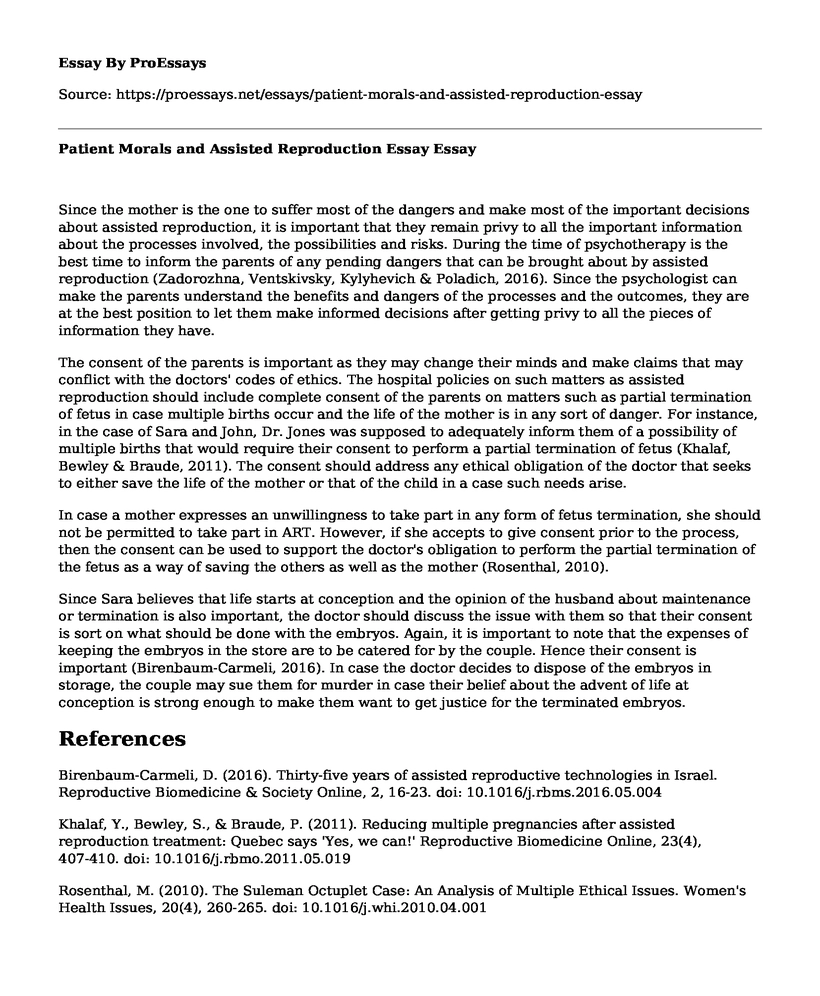Since the mother is the one to suffer most of the dangers and make most of the important decisions about assisted reproduction, it is important that they remain privy to all the important information about the processes involved, the possibilities and risks. During the time of psychotherapy is the best time to inform the parents of any pending dangers that can be brought about by assisted reproduction (Zadorozhna, Ventskivsky, Kylyhevich & Poladich, 2016). Since the psychologist can make the parents understand the benefits and dangers of the processes and the outcomes, they are at the best position to let them make informed decisions after getting privy to all the pieces of information they have.
The consent of the parents is important as they may change their minds and make claims that may conflict with the doctors' codes of ethics. The hospital policies on such matters as assisted reproduction should include complete consent of the parents on matters such as partial termination of fetus in case multiple births occur and the life of the mother is in any sort of danger. For instance, in the case of Sara and John, Dr. Jones was supposed to adequately inform them of a possibility of multiple births that would require their consent to perform a partial termination of fetus (Khalaf, Bewley & Braude, 2011). The consent should address any ethical obligation of the doctor that seeks to either save the life of the mother or that of the child in a case such needs arise.
In case a mother expresses an unwillingness to take part in any form of fetus termination, she should not be permitted to take part in ART. However, if she accepts to give consent prior to the process, then the consent can be used to support the doctor's obligation to perform the partial termination of the fetus as a way of saving the others as well as the mother (Rosenthal, 2010).
Since Sara believes that life starts at conception and the opinion of the husband about maintenance or termination is also important, the doctor should discuss the issue with them so that their consent is sort on what should be done with the embryos. Again, it is important to note that the expenses of keeping the embryos in the store are to be catered for by the couple. Hence their consent is important (Birenbaum-Carmeli, 2016). In case the doctor decides to dispose of the embryos in storage, the couple may sue them for murder in case their belief about the advent of life at conception is strong enough to make them want to get justice for the terminated embryos.
References
Birenbaum-Carmeli, D. (2016). Thirty-five years of assisted reproductive technologies in Israel. Reproductive Biomedicine & Society Online, 2, 16-23. doi: 10.1016/j.rbms.2016.05.004
Khalaf, Y., Bewley, S., & Braude, P. (2011). Reducing multiple pregnancies after assisted reproduction treatment: Quebec says 'Yes, we can!' Reproductive Biomedicine Online, 23(4), 407-410. doi: 10.1016/j.rbmo.2011.05.019
Rosenthal, M. (2010). The Suleman Octuplet Case: An Analysis of Multiple Ethical Issues. Women's Health Issues, 20(4), 260-265. doi: 10.1016/j.whi.2010.04.001
Zadorozhna, T., Ventskivsky, B., Kylyhevich, S., & Poladich, I. (2016). Immunohistochemical features of progesterone receptors expression of placental barrier in women with multiple pregnancies resulting from assisted reproduction. Pathologia, 0(1). doi: 10.14739/2310-1237.2016.1.71183
Cite this page
Patient Morals and Assisted Reproduction Essay. (2022, Aug 30). Retrieved from https://proessays.net/essays/patient-morals-and-assisted-reproduction-essay
If you are the original author of this essay and no longer wish to have it published on the ProEssays website, please click below to request its removal:
- Paper Example on Sickle Cells Anemia
- Causes and Effects of Anterograde Amnesia Essay
- Research Paper on Amyotrophic Lateral Sclerosis
- Case Diagnosis: Osteoarthritis Paper Example
- Application for the School of Nursing
- Essay Example on Emergency Management: Preparing Communities to Counter Disasters
- Reflective Essay in Nursing: Examining Cultural Contexts







